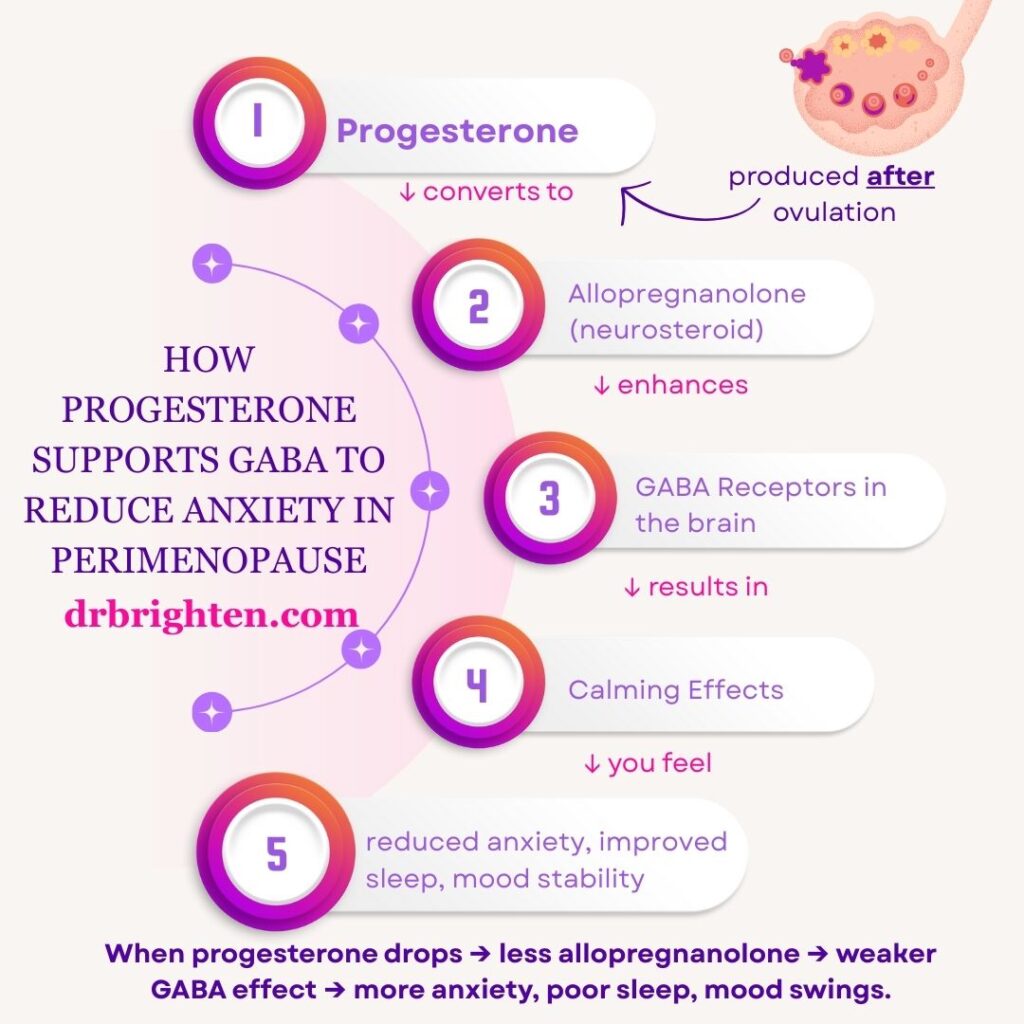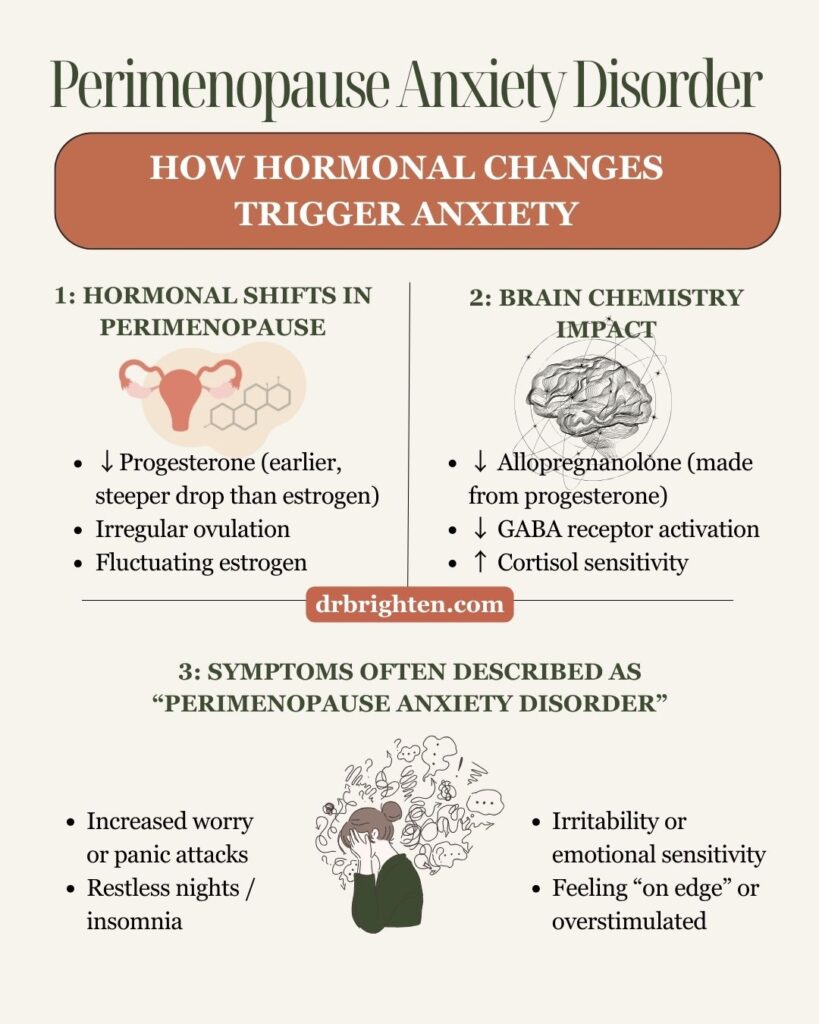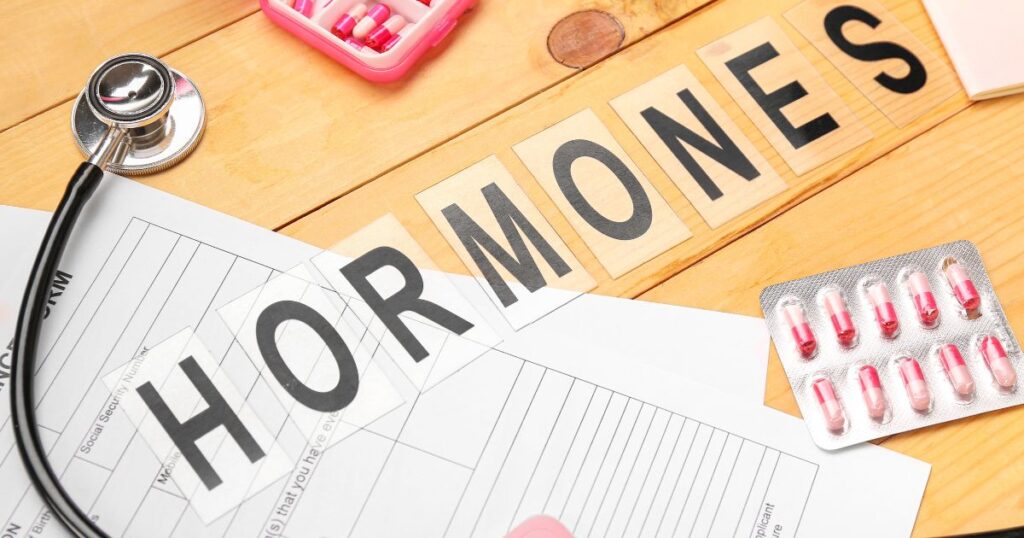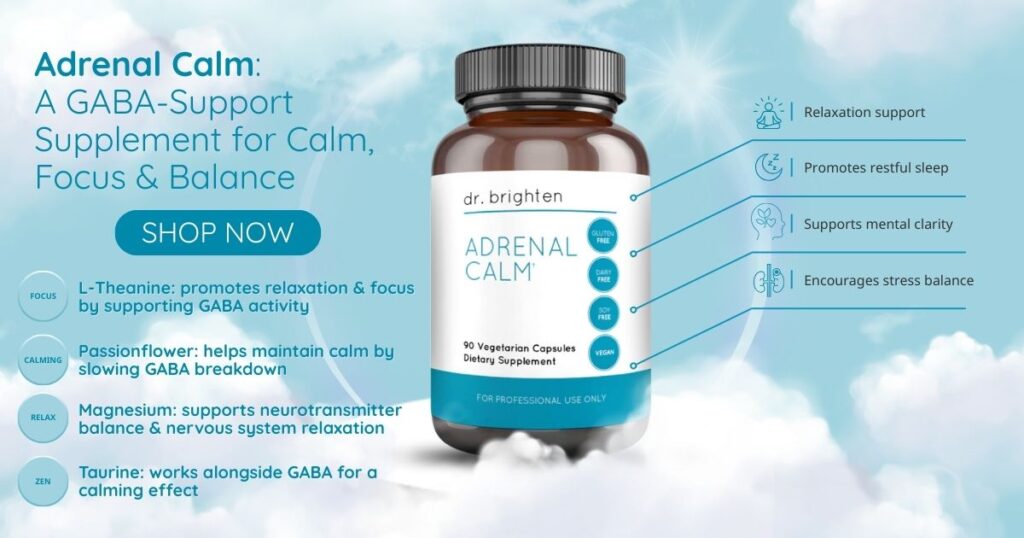Hormonal changes during midlife, including perimenopause and menopause, usually cause more than just hot flashes and irregular cycles. For many women, this time can trigger what feels like a perimenopause anxiety disorder—sudden waves of worry, restless nights, and emotional unease. At least 40% to 50% of perimenopausal women1 report dealing with mental health challenges, such as mood swings and insomnia, that they describe as being similar to PMS2.
One of the biggest culprits behind these changes? Progesterone. Specifically, the decline in progesterone levels during perimenopause can disrupt a powerful calming pathway in the brain: your GABA system.
In this article, we’ll explore the connection between progesterone and GABA, why this matters so much for mental health and sleep, and what you can do to support your body naturally.
In this article:
- Quick Summary: Progesterone, GABA & Anxiety in Perimenopause
- Why Anxiety, Sleep Changes, and Mood Swings Increase in Perimenopause
- What Happens to Progesterone Levels in Perimenopause and How Does It Affect Symptoms?
- Why Progesterone Is Critical for Mood and Sleep in Perimenopause and Menopause
- How Low Progesterone and GABA Changes Drive Symptoms of Perimenopause Anxiety Disorder
- How Bioidentical Progesterone Therapy Supports GABA, Reduces Anxiety, and Improves Sleep in Perimenopause
- Natural GABA Support in Perimenopause: How Passionflower and L-Theanine Help Reduce Anxiety
- Lifestyle Strategies for Managing Anxiety and Supporting GABA During Perimenopause and Menopause
- Frequently Asked Questions About Progesterone, GABA, and Perimenopause
- Key Takeaways: Supporting Progesterone and GABA to Ease Anxiety and Improve Sleep in Midlife
Quick Summary: Progesterone, GABA & Anxiety in Perimenopause
During perimenopause, progesterone levels decline earlier and more sharply than estrogen, weakening the brain’s calming GABA system. This can trigger new or worsening anxiety, poor sleep, and heightened stress sensitivity—even in women who’ve never experienced these issues before. Supporting progesterone and GABA together can help restore calm, improve sleep, and stabilize mood.
Key Takeaways:
- Progesterone → Allopregnanolone → GABA: Progesterone converts into a neurosteroid that boosts GABA’s calming effect on the brain.
- Low Progesterone = Lower GABA Activity: Leads to anxiety, irritability, restlessness, and insomnia in midlife.
- Bioidentical Progesterone Therapy: Can enhance GABA activity, improve sleep quality, and stabilize mood.
- Natural GABA Boosters: Passionflower, L-theanine, magnesium, and lifestyle shifts support relaxation. You’ll find these in our Adrenal Calm formula, which is designed to be taken in the evening so you can get your best sleep.
- Lifestyle Strategies: Balance blood sugar, support circadian rhythm, reduce cortisol spikes, and limit stimulants/alcohol.

Why Anxiety, Sleep Changes, and Mood Swings Increase in Perimenopause
Perimenopause isn’t just about hot flashes and irregular cycles — for many women, the first signs are changes in mood, sleep, and stress resilience. As hormones shift, your brain and nervous system respond in ways that can feel unsettling, even if you’ve never struggled with mental health before.
Common mental health and sleep changes in perimenopause include:
- New or worsening anxiety or panic attacks
- Trouble falling asleep or staying asleep
- Feeling “on edge” or more easily overwhelmed
- PMS-like mood swings, irritability, or unexplained sadness
- Heightened emotional sensitivity and stress reactivity
In fact, 40–50% of women in perimenopause report significant mental health symptoms, often describing them as similar to PMS, but more intense and unpredictable. These changes can occur years before your periods fully stop.
These changes are sometimes referred to as perimenopause anxiety disorder, a term women use to describe the hormone-driven mood and sleep issues that appear or worsen in midlife.
The underlying reason? Hormonal fluctuations — especially an earlier and more dramatic drop in progesterone — disrupt brain chemistry that supports calm, stable moods, and restorative sleep. Understanding this connection is the first step in feeling more like yourself again.
Related: When Does Perimenopause Start and How Long Does It Last?
What Happens to Progesterone Levels in Perimenopause and How Does It Affect Symptoms?
During a woman's reproductive years, progesterone is produced primarily by the ovaries after ovulation. But in perimenopause, ovulation becomes irregular and less frequent, which causes progesterone levels to drop earlier and more significantly than estrogen levels.
This hormonal imbalance (lower levels of progesterone, even if estrogen remains within the normal range) often shows up as symptoms like:
- Increased anxiety or irritability
- Insomnia or light, restless sleep
- Feeling emotionally “on edge”
- Mood swings, which can include weepiness
The symptoms above are all signs of low progesterone symptoms in perimenopause, and they often begin in your late 30s to mid-40s, before your periods have even stopped.
Related: The Anxiety Hormone Connection
Why Progesterone Is Critical for Mood and Sleep in Perimenopause and Menopause
Progesterone acts as a neurosteroid3, a type of steroid synthesized in the central nervous system (including the brain) that helps regulate mood, cognition, and behavior.
Once in the brain, progesterone is converted into a compound called allopregnanolone, which has the job of calming the nervous system. Allopregnanolone enhances the function of GABA receptors4, the same receptors targeted by many anti-anxiety medications.
When progesterone levels drop during perimenopause, GABA function can become impaired5, and this often leads to an uptick in anxious thoughts, stress sensitivity, and difficulty falling or staying asleep.
Related:
Struggling with Sleep & Anxiety? Are Low Progesterone Symptoms to Blame with Dr. Carrie Jones
Which Hormones Affect Sleep? The Hormone-Sleep Connection Explained
What Happens to GABA Levels During Perimenopause and Why It Impacts Anxiety and Sleep:
GABA (gamma-aminobutyric acid) is the brain's primary inhibitory neurotransmitter6.
You can think of GABA as your brain's “brake pedal,” since it helps to slow you down, quiets racing thoughts, and allows you to drift into restful and restorative sleep more easily.
When GABA is functioning well, it promotes:
- Relaxation and emotional steadiness
- Relief from anxiety and overwhelm
- Deeper, more restorative sleep
- A balanced response to stress
In perimenopause, many women experience new or worsening anxiety, trouble sleeping, and heightened sensitivity to stress, even if they’ve never had these issues before. A big reason why? GABA’s calming influence weakens.
This isn’t just a random imbalance; it’s directly tied to the drop in progesterone that happens in perimenopause. That’s because progesterone impacts how your brain produces and uses GABA.
How Low Progesterone and GABA Changes Drive Symptoms of Perimenopause Anxiety Disorder
Here’s where things get deeper: progesterone also affects brain chemistry directly.
Allopregnanolone (which progesterone is converted into) is a powerful modulator of GABA-A receptors. These are like docking stations in the brain that GABA binds to in order to calm the nervous system.
When allopregnanolone is present, it acts like a volume booster for GABA:
- It helps GABA bind more easily to its receptors.
- It increases the strength of GABA’s calming signals.
- It enhances your ability to relax, stay emotionally regulated, and fall asleep.
But when progesterone declines during perimenopause, your brain makes less allopregnanolone, and GABA doesn’t work as effectively. This drop can feel like your inner “brakes” have suddenly stopped working. You may feel overstimulated, anxious, or unable to wind down at night.
This also helps explain a frustrating phenomenon: Some women find that anti-anxiety medications (like benzodiazepines) and antidepressants, some of which target GABA receptors, become less effective in midlife and during menopause7.
Without allopregnanolone present to amplify GABA’s effects, those medications might not work as well as they previously did. That's because the brain’s natural GABA-enhancing support system is diminished.
You can see why the connection between hormones, neurosteroids, and neurotransmitters all becomes more fragile during perimenopause and menopause, even in women who have never struggled with these issues before.

How Bioidentical Progesterone Therapy Supports GABA, Reduces Anxiety, and Improves Sleep in Perimenopause
One solution to managing low progesterone symptoms in perimenopause is progesterone therapy8. Bioidentical progesterone (which is identical to what your body produces) can help restore calm and support GABA activity.
When used cyclically or continuously, progesterone therapy can potentially help to:
- Reduce anxiety
- Improve sleep
- Stabilize mood
- Support hormone balance alongside estrogen therapy
Related: Is Progesterone Cream the Answer for Hormone Imbalance?
For women experiencing symptoms consistent with perimenopause anxiety disorder, bioidentical progesterone therapy can help restore GABA activity, reduce anxiety, and improve sleep quality. However, in some cases, anxiety is made worse with progesterone in what is called progesterone intolerance. Meeting with a licensed healthcare professional can help you navigate this.
When Is the Best Time to Take Progesterone for Perimenopause to Improve Sleep and Mood?
Many experts recommend taking progesterone in the evening to support relaxation and sleep9. It can be used alone or alongside estrogen, depending on your symptoms and health history.
Always talk to a qualified healthcare provider before starting hormone therapy to experience the best results. The exact protocol that will be best for you depends on your unique situation, so there isn't a one-size-fits-all method of using progesterone in perimenopause that will work for everyone.
To learn more about different methods of taking progesterone in perimenopause, you can read this article: When to Take Progesterone for Perimenopause.

Natural GABA Support in Perimenopause: How Passionflower and L-Theanine Help Reduce Anxiety
While there are some products labeled as “GABA supplements”, it’s still unclear how much GABA crosses the blood-brain barrier. That’s why many women turn to nutrients and herbs that indirectly support GABA signaling instead.
If you're not ready for hormone therapy or want to boost your results, natural remedies—including the use of certain herbs, supplements, and lifestyle changes like practicing mindfulness and exercising—can also support GABA pathways.
Two supplements I recommend considering are passionflower and L-theanine, which have been shown to be naturally calming and supportive of stable moods and restful sleep.
Passionflower for GABA Support and Anxiety Relief in Perimenopause
Passionflower is a calming herb that increases GABA levels10 in the brain and has been shown to help manage anxiety11 without having sedative effects (in other words, it's relaxing without making you drowsy).
It works by slowing the breakdown of GABA, allowing this calming neurotransmitter to stay active in the brain longer. Studies suggest passionflower may be especially helpful for easing restlessness, worry, and sleep disturbances12 related to hormonal changes.
L-Theanine for Calm, Focus, and Sleep Support During Perimenopause
L-theanine, an amino acid found in green tea, promotes relaxation and focus by boosting GABA13 and alpha brain waves. It often helps with both mental clarity and calmness, which means it's a win-win for mood support. It's one of the best sleep supplements, and one that can be used by many women without causing side effects.
These two ingredients can work synergistically to restore the GABA system's ability to regulate your response to stress, your mindset, energy, and mood.
Related:
How to Increase Progesterone Levels Naturally
15 Perimenopause Supplements for Happy Hormones
Try Adrenal Calm for GABA and Stress Support:
If you’re feeling wired, anxious, or emotionally on edge, especially during perimenopause, my Adrenal Calm formula offers a targeted way to support your nervous system and cope more easily with anxiety and sleep issues that are so common during perimenopause and menopause.
This blend combines magnesium, B vitamins, and calming amino acids like L-theanine and taurine with time-tested botanicals including passionflower, lemon balm, ashwagandha, and valerian root.
It's designed to promote a sense of calm and help regulate stress hormones, including by supporting adrenal function and healthy catecholamine balance, so you can feel more centered, focused, and resilient throughout your day. It's also non-sedating and safe for daily use.
Adrenal Calm includes:
- L-theanine and passionflower to support GABA activity
- Phosphatidylserine to reduce nighttime cortisol14 spikes
- Magnesium to relax the nervous system and ease tension
- B vitamins for nervous system support
Lifestyle Strategies for Managing Anxiety and Supporting GABA During Perimenopause and Menopause
Anxiety during perimenopause and menopause isn’t just “in your head”; it’s often a biological response to shifting hormone levels, disrupted sleep, and increased sensitivity to stress. The good news is that small, intentional lifestyle shifts can help stabilize your nervous system and improve your mood naturally.
Below are evidence-based remedies you can start integrating into your daily life:
1. Prioritize Blood Sugar Balance
Fluctuating blood sugar can mimic or worsen anxiety symptoms. Stabilizing your blood sugar with every meal helps prevent mood crashes, irritability, and energy slumps.
Try this:
- Eat protein, fiber, and healthy fats with every meal
- Avoid skipping meals, especially breakfast
- Limit ultra-processed foods and refined sugars
- Try adding a tablespoon of apple cider vinegar to water before meals to blunt blood sugar spikes
If your usual workouts and clean eating habits suddenly aren’t cutting it anymore, it’s not your fault—it’s your hormones. The Perimenopause Weight Loss Action Plan is a free, doctor-designed guide that gives you the tools, structure, and support your body needs in your 40s and beyond.
Instead of punishing restrictions or endless cardio, this plan helps you rebalance hormones, calm inflammation, and support metabolism, all while feeling nourished and energized. Download it today and get a step-by-step strategy designed specifically for your changing body, so you can finally lose the weight, regain your energy, and feel like yourself again.
2. Support Your Circadian Rhythm
Your sleep-wake cycle is closely tied to hormone and neurotransmitter balance. Disrupted circadian rhythms can heighten cortisol and reduce melatonin, worsening anxiety and insomnia.
Try this:
- Get 10–20 minutes of natural morning light as early as possible
- Avoid screens and bright lights 1–2 hours before bed
- Keep a consistent sleep-wake schedule, even on weekends
- Use blue light-blocking glasses in the evening if needed
3. Reduce Cortisol Spikes with Nervous System Tools
High cortisol levels can make you feel wired, jumpy, and overwhelmed. Calming the nervous system through intentional practices helps regulate the HPA (hypothalamic-pituitary-adrenal) axis and reduce stress reactivity.
Try this:
- Include mindfulness practices in your day, like meditation, which have been shown to help ease stress and manage menopause symptoms15
- Practice slow, diaphragmatic breathing (like 4-7-8 or box breathing)
- Add 10 minutes of restorative movement daily (yoga, walking, stretching)
- Use vagus nerve-stimulating tools like humming, gargling, or cold exposure
- Take 5-minute “pause breaks” throughout your day to reset

4. Create a Wind-Down Routine at Night
Many women in perimenopause report feeling tired all day, only to feel wide awake and anxious at night. A calming evening routine helps signal to your body and brain that it’s safe to rest.
Try this:
- Shut down screens and work 60–90 minutes before bed
- Dim lights, play soft music, or read a calming book
- Take a warm magnesium-rich bath with Epsom salts
- Sip a calming tea with passionflower or lemon balm
5. Move Your Body Daily, But Don’t Overdo It
Exercise is one of the best ways to reduce anxiety, boost GABA, and support mood. But excessive, high-intensity workouts can spike cortisol and worsen hormonal imbalance in midlife.
Try this:
- Focus on strength training 2–4 times per week
- Incorporate daily walks, rebounding, or low-impact cardio
- Save high-intensity intervals for 1–2 times a week, max
- Always listen to your energy levels, since rest is productive too
6. Limit Stimulants and Reduce Alcohol
Caffeine and alcohol both impact GABA signaling and can worsen anxiety, especially in midlife when hormones are already in flux.
Try this:
- Switch to green tea or matcha for a gentler lift
- Cut off caffeine after noon.
- Limit alcohol to 1–2 nights a week, if at all
- Try adaptogenic mocktails or herbal drinks instead
7. Build Emotional Resilience Through Connection
Hormonal shifts can make you feel more emotionally vulnerable. Staying socially connected and expressing your feelings can be incredibly healing during this season.
Try this:
- Schedule regular chats with a trusted friend or therapist, or join a women’s circle, support group, or online community
- Practice journaling or expressive writing for self-reflection
- Prioritize joy, laughter, and creativity every week
Frequently Asked Questions About Progesterone, GABA, and Perimenopause
Yes. Progesterone is converted in the brain into allopregnanolone, a neurosteroid that enhances GABA activity. GABA is your brain’s primary calming neurotransmitter, so when progesterone drops in perimenopause, GABA signaling weakens, making anxiety, restlessness, and emotional reactivity more likely.
Perimenopause anxiety disorder is not an official medical diagnosis, but a term many women use to describe new or worsening anxiety during the perimenopausal years. It’s often driven by hormonal changes, especially a decline in progesterone, that disrupt brain chemistry, reduce GABA activity, and increase stress sensitivity. Symptoms can include excessive worry, panic attacks, restlessness, irritability, and difficulty sleeping.
Bioidentical progesterone can improve sleep by boosting GABA activity, reducing nighttime awakenings, and promoting relaxation. Many women find taking progesterone in the evening supports deeper, more restorative sleep.
GABA (gamma-aminobutyric acid) is a neurotransmitter that acts like the brain’s “brake pedal,” slowing down overactive nerve signals. In perimenopause, declining progesterone reduces the brain’s ability to amplify GABA’s calming effects, which can lead to anxiety, poor sleep, and increased stress sensitivity.
The research on oral GABA supplements is mixed, as it’s unclear how much crosses the blood-brain barrier. Many experts recommend using nutrients and herbs—such as L-theanine, passionflower, and magnesium—that indirectly enhance GABA activity instead.
Yes. Lifestyle strategies like balancing blood sugar, managing stress, supporting your circadian rhythm, and exercising regularly can improve GABA signaling. Certain supplements, including L-theanine, passionflower, and magnesium, may also help.
Some anti-anxiety medications, including benzodiazepines, target GABA receptors. Without allopregnanolone from progesterone to amplify GABA’s effects, these medications may feel less effective in perimenopause. Hormone changes can alter how the brain responds to these treatments.
Evening is generally best, as progesterone’s calming effects can support relaxation and sleep. The exact timing and dosage should be determined with a qualified healthcare provider based on your symptoms and overall health.
Key Takeaways: Supporting Progesterone and GABA to Ease Anxiety and Improve Sleep in Midlife
If you’ve been feeling anxious, wired-but-tired, or emotionally off-balance in midlife, you’re not alone. These experiences are common in what’s often called perimenopause anxiety disorder, and supporting both progesterone and GABA may be the key to feeling calm, rested, and resilient again.
- Many women in perimenopause or menopause experience:
- Sudden onset of anxiety or panic attacks
- “Tired but wired” sensations in the evening
- Light, fragmented sleep with frequent wake-ups
- Heightened startle reflex or emotional reactivity
- In short, even women who have never struggled with anxiety before may find themselves feeling edgy, overwhelmed, or unable to relax due to these shifts in GABA sensitivity and production.
- Supporting both progesterone and GABA pathways can be key to feeling balanced again.
- Is there such a thing as a GABA supplement? Technically, yes—but supporting your body’s natural GABA activity through progesterone balance, lifestyle changes, and calming nutrients is often more effective.
- If you're feeling overwhelmed, anxious, or wired-but-tired in midlife, you're not alone, and support is available. Consider working with a knowledgeable practitioner, exploring progesterone therapy for perimenopause, and using gentle, effective tools like Adrenal Calm to nourish your nervous system from the inside out.
References
- https://pmc.ncbi.nlm.nih.gov/articles/PMC9190958/ ↩︎
- https://www.hopkinsmedicine.org/health/wellness-and-prevention/perimenopause-and-anxiety ↩︎
- https://pubmed.ncbi.nlm.nih.gov/8743966/ ↩︎
- https://www.sciencedirect.com/science/article/pii/S2451965022000187 ↩︎
- https://pmc.ncbi.nlm.nih.gov/articles/PMC9850658/ ↩︎
- https://mhanational.org/resources/what-is-gaba/ ↩︎
- https://themenopausecharity.org/information-and-support/what-can-help/treatment-options/hormone-replacement-therapy/antidepressants-and-menopause/ ↩︎
- https://womensmentalhealth.org/posts/in-brief-does-micronized-progesterone-relieve-perimenopausal-symptoms/ ↩︎
- https://my.clevelandclinic.org/health/treatments/15245-hormone-therapy-for-menopause-symptoms ↩︎
- https://pubmed.ncbi.nlm.nih.gov/26912265/ ↩︎
- https://pmc.ncbi.nlm.nih.gov/articles/PMC7914492/ ↩︎
- https://pmc.ncbi.nlm.nih.gov/articles/PMC5542920/ ↩︎
- https://pmc.ncbi.nlm.nih.gov/articles/PMC11233886/ ↩︎
- https://my.clevelandclinic.org/health/drugs/25129-phosphatidylserine ↩︎
- https://pmc.ncbi.nlm.nih.gov/articles/PMC10086901/ ↩︎



